The Current Status of Migration Requires a New Look at this Growing Phenomenon
Thursday, 04 June 2009, 14:53 From May 25 to 27 the annual international conference for representatives of church social organizations of Europe is held in Lviv - Bryukhovychi. Over twenty participants from 10 European countries take part in it. The meeting is co-organized by Caritas of Europe and Caritas of Ukraine. As said by Andrey Vas’kovych, President of Caritas of Ukraine, in his opening speech: “Its purpose is to present to participants the Ukrainian experience in the sphere of migration and to discuss possibilities for transnational cooperation.”
From May 25 to 27 the annual international conference for representatives of church social organizations of Europe is held in Lviv - Bryukhovychi. Over twenty participants from 10 European countries take part in it. The meeting is co-organized by Caritas of Europe and Caritas of Ukraine. As said by Andrey Vas’kovych, President of Caritas of Ukraine, in his opening speech: “Its purpose is to present to participants the Ukrainian experience in the sphere of migration and to discuss possibilities for transnational cooperation.”
 From May 25 to 27 the annual international conference for representatives of church social organizations of Europe is held in Lviv - Bryukhovychi. Over twenty participants from 10 European countries take part in it. The meeting is co-organized by Caritas of Europe and Caritas of Ukraine. As said by Andrey Vas’kovych, President of Caritas of Ukraine, in his opening speech: “Its purpose is to present to participants the Ukrainian experience in the sphere of migration and to discuss possibilities for transnational cooperation.”
Through the rich experience of emigration and immigration in certain EU countries (Germany, France, Ireland, Italy etc.), it is easy to notice the ineffectiveness of legal instruments for the management of migratory issues. Evidence of this can be seen through growing public tension, numerous violations of fundamental human rights, increasing numbers of migrants with unregulated statuses, increasing incidences of human trafficking for sexual or labor exploitation, an expanding network of organized crime associated with migration, as well as increased illegal border crossings.
According to the UGCC Commission for Matters of Immigrants, the ineffectual migratory policies of the EU are a direct reflection of their unpreparedness to the new conditions and challenges of global migration. Old methods do not always yield desired results. “An over emphasis on border patrol can lead to the formation of a new ‘iron curtain’ and the appearance of repressed social formations that will increase public tension,” remarked Hryhoriy Seleschuk, head of the UGCC Commission for Matters of Immigrants and member of the Migratory Commission Caritas Europe. “In fact, when nearly 10% of a population is of foreign origin (and in some places up to 20-25%), attempts of preserving public tension can lead to considerable conflict.”
Thus, much attention was paid to the high percent of immigrants with unregulated statuses, which in some regions can be as high as 60-70% of immigrants. This creates unbalance in the system of public welfare because a considerable amount of money gets channeled into the black market. This leads to diminished social funds. However, it is not possible to entirely cut these people off from social services. For example, despite legislation in certain countries that does not allow illegal immigrants to access medical services, they can seek it from charitable organizations instead.
Recently, European Union countries have been attempting to work out the problems associated with migration. The separate sections of policy of the Eastern Partnership and Stockholm Program (a new program for regulating immigration) are devoted to finding resolutions for these issues. The essence of these initiatives consists of actively bringing state and non-state organizations from the original countries of the immigrants to be involved in the international projects. International problems can only be effectively settled through international communication.
On May 28 (10.30-12.00) at the press conference hall of the Metropolitan Chambers (Saint George Sq., 5, Lviv) a final press conference will be held where the results will be summarized. Participants in the press conference include:
- Li Guen Ngo Din, President of the Migratory Commission of Caritas Europe (Rome, Italy);
- Peter Ferkhage, Responsible in matters of immigration of Caritas of Europe (Brussels, Belgium);
- George Joseph, Head of Caritas of Sweden (Stockholm, Sweden);
- Hryhoriy Seleschuk, Head of Commission of the UGCC in Matters of Immigrants, member of the Migratory Commission Caritas Europe.
From May 25 to 27 the annual international conference for representatives of church social organizations of Europe is held in Lviv - Bryukhovychi. Over twenty participants from 10 European countries take part in it. The meeting is co-organized by Caritas of Europe and Caritas of Ukraine. As said by Andrey Vas’kovych, President of Caritas of Ukraine, in his opening speech: “Its purpose is to present to participants the Ukrainian experience in the sphere of migration and to discuss possibilities for transnational cooperation.”
Through the rich experience of emigration and immigration in certain EU countries (Germany, France, Ireland, Italy etc.), it is easy to notice the ineffectiveness of legal instruments for the management of migratory issues. Evidence of this can be seen through growing public tension, numerous violations of fundamental human rights, increasing numbers of migrants with unregulated statuses, increasing incidences of human trafficking for sexual or labor exploitation, an expanding network of organized crime associated with migration, as well as increased illegal border crossings.
According to the UGCC Commission for Matters of Immigrants, the ineffectual migratory policies of the EU are a direct reflection of their unpreparedness to the new conditions and challenges of global migration. Old methods do not always yield desired results. “An over emphasis on border patrol can lead to the formation of a new ‘iron curtain’ and the appearance of repressed social formations that will increase public tension,” remarked Hryhoriy Seleschuk, head of the UGCC Commission for Matters of Immigrants and member of the Migratory Commission Caritas Europe. “In fact, when nearly 10% of a population is of foreign origin (and in some places up to 20-25%), attempts of preserving public tension can lead to considerable conflict.”
Thus, much attention was paid to the high percent of immigrants with unregulated statuses, which in some regions can be as high as 60-70% of immigrants. This creates unbalance in the system of public welfare because a considerable amount of money gets channeled into the black market. This leads to diminished social funds. However, it is not possible to entirely cut these people off from social services. For example, despite legislation in certain countries that does not allow illegal immigrants to access medical services, they can seek it from charitable organizations instead.
Recently, European Union countries have been attempting to work out the problems associated with migration. The separate sections of policy of the Eastern Partnership and Stockholm Program (a new program for regulating immigration) are devoted to finding resolutions for these issues. The essence of these initiatives consists of actively bringing state and non-state organizations from the original countries of the immigrants to be involved in the international projects. International problems can only be effectively settled through international communication.
On May 28 (10.30-12.00) at the press conference hall of the Metropolitan Chambers (Saint George Sq., 5, Lviv) a final press conference will be held where the results will be summarized. Participants in the press conference include:
- Li Guen Ngo Din, President of the Migratory Commission of Caritas Europe (Rome, Italy);
- Peter Ferkhage, Responsible in matters of immigration of Caritas of Europe (Brussels, Belgium);
- George Joseph, Head of Caritas of Sweden (Stockholm, Sweden);
- Hryhoriy Seleschuk, Head of Commission of the UGCC in Matters of Immigrants, member of the Migratory Commission Caritas Europe.
Information Department of the UGCC
LATEST NEWS

We can imagine what the prayer of the prisoners in the Russian torture centers in the Ukrainian Kharkiv region was like – Head of the UGCC on the 206th day of the war 17 September
A vast cemetery, a mass burial, was found near the city of Izyum, in which more than 400 innocently killed and tortured people have already been...
-
 Глава УГКЦ у 158-й день війни: «Нехай Господь прийме з уст нашої Церкви псалми та моління за всіх тих, які особливо просять нашої молитви»
Глава УГКЦ у 158-й день війни: «Нехай Господь прийме з уст нашої Церкви псалми та моління за всіх тих, які особливо просять нашої молитви»
-
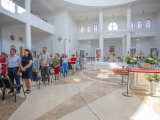 «Сила, яка походить із вірності Христові, є стержнем, який ніхто не може зламати», – Блаженніший Святослав
«Сила, яка походить із вірності Христові, є стержнем, який ніхто не може зламати», – Блаженніший Святослав
-
 Глава УГКЦ у 157-й день війни: «В ім’я Боже ми засуджуємо звірства в Оленівці і світ повинен це засудити як особливий вияв дикості й жорстокості»
Глава УГКЦ у 157-й день війни: «В ім’я Боже ми засуджуємо звірства в Оленівці і світ повинен це засудити як особливий вияв дикості й жорстокості»
-
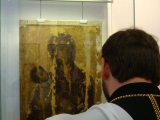 «Боже, почуй наш плач і поспіши нам на допомогу і порятунок!», – Глава УГКЦ у 156-й день війни
«Боже, почуй наш плач і поспіши нам на допомогу і порятунок!», – Глава УГКЦ у 156-й день війни
-
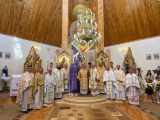 «Бог йому дав серце і душу українського народу»: відбулася щорічна проща до Прилбичів з нагоди уродин митрополита Андрея Шептицького
«Бог йому дав серце і душу українського народу»: відбулася щорічна проща до Прилбичів з нагоди уродин митрополита Андрея Шептицького
-
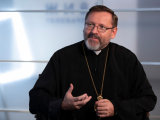 Глава УГКЦ: «Я горджуся українськими патріотами, які без найменшої краплі ненависті готові захищати своє»
Глава УГКЦ: «Я горджуся українськими патріотами, які без найменшої краплі ненависті готові захищати своє»
-
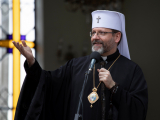 Блаженніший Святослав закликав українську молодь скласти присягу на вірність Христові
Блаженніший Святослав закликав українську молодь скласти присягу на вірність Христові
-
 Глава УГКЦ у 155-й день війни: «Помолімося, щоб не втратити скарбу віри князя Володимира»
Глава УГКЦ у 155-й день війни: «Помолімося, щоб не втратити скарбу віри князя Володимира»
-
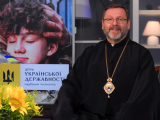 Блаженніший Святослав у День державності України: «Наша Держава – це для нас питання життя або смерті»
Блаженніший Святослав у День державності України: «Наша Держава – це для нас питання життя або смерті»
-
 Глава УГКЦ у 154-й день війни: «Нехай Господь Бог прийме у свої вічні обійми журналістів, які віддали за правду своє життя в Україні»
Глава УГКЦ у 154-й день війни: «Нехай Господь Бог прийме у свої вічні обійми журналістів, які віддали за правду своє життя в Україні»
-
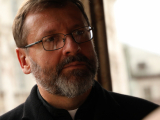 Глава УГКЦ у 153-й день війни: «Принесімо наш біль перед Боже обличчя і будьмо певні, що Він нас вислухає»
Глава УГКЦ у 153-й день війни: «Принесімо наш біль перед Боже обличчя і будьмо певні, що Він нас вислухає»
-
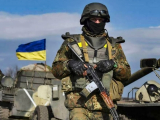 Глава УГКЦ у 152-й день війни: «Помолімся молитву заступництва за наших воїнів»
Глава УГКЦ у 152-й день війни: «Помолімся молитву заступництва за наших воїнів»
-
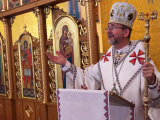 «Віруюча людина не може бути байдужою, коли бачить страждання іншої людини», – владика Богдан Дзюрах
«Віруюча людина не може бути байдужою, коли бачить страждання іншої людини», – владика Богдан Дзюрах
-
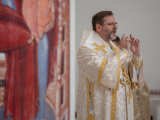 «Серед нашого страждання творімо простір для прояву Божої всемогутності», – Глава УГКЦ у 6-ту неділю після П’ятдесятниці
«Серед нашого страждання творімо простір для прояву Божої всемогутності», – Глава УГКЦ у 6-ту неділю після П’ятдесятниці
-
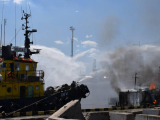 Глава УГКЦ у 151-й день війни: «Російське віроломство ми перемагаємо силою любові до нашої Батьківщини»
Глава УГКЦ у 151-й день війни: «Російське віроломство ми перемагаємо силою любові до нашої Батьківщини»

